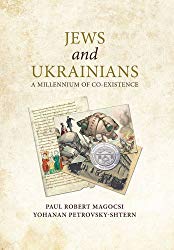
In this edition of Ukrainian Jewish Heritage, we will be discussing Jews and Ukrainians: A Millennium of Co-Existence by Paul Robert Magocsi and Yohanan Petrovsky-Shtern.
Jews and Ukrainians: A Millennium of Co-Existence is a comprehensive historical account of the relationship between Jews and ethnic Ukrainians, both in Ukraine and the diaspora. It was written primarily for a North American audience, but it has also been published in the Ukrainian language. It received a special recognition award at the 2016 Lviv Book Forum. Commissioned by the Ukrainian-Jewish Encounter and published by the University of Toronto Press, this book attempts to fill the gap of what Jews and Ukrainians know about each other. In the Introduction, the writers state, “There is much that ordinary Ukrainians do not know about Jews and that ordinary Jews do not know about Ukrainians. There is even more that Jews and Ukrainians do not know about themselves.” (p. 1)
In the twelve thematic chapters of this book, the writers construct a parallel narrative of the two groups looking at: settlement patterns, history, economics, culture, religion, language, literature, theater, architecture, art, music, the diaspora, as well as contemporary political and social life. Each writer wrote separately – one concentrating on ethnic Ukrainians and one concentrating on Jews – however, they also collaborated in sections. They soon discovered that, “what emerged from our parallel narrative was a single story in which ethnic Ukrainians and Jews displayed as many similarities as differences.” (p. 1)
The book begins with an examination of how “Stereotypes, Perceptions and Misperceptions,” often based on blatant prejudice, cloud relations between Jews and Ukrainians. The relationship between the two groups goes back a thousand years. The first Jewish settlers moved to Ukrainian lands as maritime merchants from the Mediterranean Basin. They settled in the coastal towns of the Black Sea along with Greek colonists. During the time of Kievan Rus, Jews started arriving from central Europe and settling in central and northern Ukrainian towns. There are references to Jewish settlers in the literature of the period.
Jews and Ukrainians continued to live together in the land that is contemporary Ukraine for hundreds of years despite rule by foreign governments. By 1900, the inhabitants on the lands of present-day Ukraine totaled 30.6 million comprised of 72.4% ethnic Ukrainians and 8.7% Jews. In sharp contrast, after the tragic events of the 20th century, such as the Holocaust and the Holodomor, today’s ethnic Ukrainian population is about 37.5 million with a Jewish population of only of 84,000 (.02%) living mostly in cities such as Kyiv, Odessa, Dnipropetrovsk (now Dnipro) and Kharkiv.
This volume is full of intricate information, insightful historical analysis, detailed graphics and maps, as well as very relevant photographs. At times, the detail almost seems encyclopedic, but the writers manage to make each and every section relevant and readable. Those new to Ukrainian studies will learn a great deal about Ukraine’s history and culture. Those who have studied both Ukrainian and Jewish culture will appreciate the commentary and the analysis of historical events. Researchers will definitely appreciate the extensive list of resources at the end of this book.
Perhaps the most important theme in this book is the evolving relationship between Jews and Ukrainians. The writers describe historical conflicts between the two groups during the Khmelnytskyi era, Polish rule, anti-Jewish pogroms of 1880’s, Babyn Yar, the Holocaust and Soviet rule. However, they also describe collaboration between the two groups during World War II, the Gorbachev era, the Orange Revolution, Kyiv’s Maidan, and contemporary Ukraine. There is an extensive examination of links between the two groups in terms of language, art, literature, and cultural life.
Paul Robert Magocsi is professor of history and political science and holds the John Yaremko Chair of Ukrainian Studies at the University of Toronto. Born in New Jersey, he completed his education at Rutgers, Princeton, and Harvard University. In 1996, he was appointed a permanent fellow of the Royal Society of Canada. He is interested in the history of nationalism, in particular among ethnic groups living in border areas. His recent works include: With Their Back to the Mountains: A History of Carpathian Rus and Carpatho-Rusyns (2015) and This Blessed Land: Crimea and the Crimean Tatars (2014)
Yohanan Petrovsky-Shtern is professor of Jewish studies and Jewish history at Northwestern University where he is the Crown Family Professor of Jewish Studies. Born in Kyiv, he completed his education at Moscow University and Brandeis University. He is interested in Jewish history, Slavic-Jewish literature, and the history and culture of Ukraine. His recent works include: The Golden Age Shtetl: A New History of Jewish Life in East Europe (2015), and Lenin’s Jewish Question (2010).
Magocsi and Petrovsky-Shtern have written an impressive book packed with encyclopedic detail while being as easy to read as a magazine. Although this book is unlikely to change deeply held perceptions, the writers believe that in order to properly appreciate Jewish-Ukrainian relations, “Jews need to know as much about Ukrainians as Ukrainians need to know about Jews.” (p. 290)
Jews and Ukrainians: A Millennium of Co-Existence is available at Chapters/Indigo and Amazon.
I’m Myra Junyk in Toronto, for Nash Holos Ukrainian Roots Radio. Until next time, Shalom!
Ukrainian Jewish Heritage is brought to you by The Ukrainian Jewish Encounter based in Toronto, Ontario. To find out more visit their website (here) and follow them on Facebook and Twitter.
![]()
Tune in to the Vancouver edition of Nash Holos Saturdays at 6pm PST on CHMB Vancouver AM1320 or streaming online. As well, the Nanaimo edition airs on Wednesdays from 11am-1pm on air at 101.7FM or online at CHLY Radio Malaspina. As well the International edition airs in over 20 countries on AM, FM, shortwave and satellite radio via PCJ Radio International.
Please support our work by purchasing this book using this link. There is no additional charge to you but it sends a few cents our way. Дякую! Thank you!

